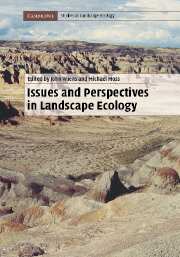Book contents
- Frontmatter
- Contents
- List of contributors
- Preface
- PART I Introductory perspectives
- PART II Theory, experiments, and models in landscape ecology
- 3 Theory in landscape ecology
- 4 Hierarchy theory and the landscape … level? or, Words do matter
- 5 Equilibrium versus non-equilibrium landscapes
- 6 Disturbances and landscapes: the little things count
- 7 Scale and an organism-centric focus for studying interspecific interactions in landscapes
- 8 The role of experiments in landscape ecology
- 9 Spatial modeling in landscape ecology
- 10 The promise of landscape modeling: successes, failures, and evolution
- PART III Landscape patterns
- PART IV Landscape dynamics on multiple scales
- PART V Applications of landscape ecology
- PART VI Cultural perspectives and landscape planning
- PART VII Retrospect and prospect
- Index
- Plate section
- References
9 - Spatial modeling in landscape ecology
from PART II - Theory, experiments, and models in landscape ecology
Published online by Cambridge University Press: 20 November 2009
- Frontmatter
- Contents
- List of contributors
- Preface
- PART I Introductory perspectives
- PART II Theory, experiments, and models in landscape ecology
- 3 Theory in landscape ecology
- 4 Hierarchy theory and the landscape … level? or, Words do matter
- 5 Equilibrium versus non-equilibrium landscapes
- 6 Disturbances and landscapes: the little things count
- 7 Scale and an organism-centric focus for studying interspecific interactions in landscapes
- 8 The role of experiments in landscape ecology
- 9 Spatial modeling in landscape ecology
- 10 The promise of landscape modeling: successes, failures, and evolution
- PART III Landscape patterns
- PART IV Landscape dynamics on multiple scales
- PART V Applications of landscape ecology
- PART VI Cultural perspectives and landscape planning
- PART VII Retrospect and prospect
- Index
- Plate section
- References
Summary
Spatial models, expert knowledge, and data
Bringing together models and data yields more than the sum of both
The Netherlands experienced quite a controversy in January 1999 when an employee of the National Institute of Public Health and the Environment (RIVM) accused his employer, in the media, of relying too much upon unvalidated models instead of empirical data. He argued that the model outcomes were unreliable and that politicians are led to believe that they represent reality, when in fact they represent an artificial universe with no link to real data (Fig. 9.1). He made an interesting point, because models are often used without being calibrated, tested, validated, or analyzed for sensitivity and/or uncertainty. Furthermore, it is usually unclear what part of the model is based upon hard data and where expert knowledge fills in the gaps.
This essay is about models, expert knowledge and data, calibration, validation, and model analysis, and how we can apply these for evaluation or prediction. We argue that all these combined produce a more powerful tool than models, experts, or data do alone. We will not discuss the importance of space, or the merits of spatially explicit versus non-spatial or non-spatially explicit models. This issue has been thoroughly discussed elsewhere (Durrett and Levin, 1994a, 1994b; Wiens, 1997). This essay is a little biased toward spatial population models and vegetation dynamics models, which are our primary fields of interest.
- Type
- Chapter
- Information
- Issues and Perspectives in Landscape Ecology , pp. 79 - 89Publisher: Cambridge University PressPrint publication year: 2005
References
- 8
- Cited by

